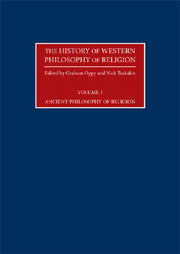Book contents
- Frontmatter
- Contents
- Editorial Introduction
- Contributors
- 1 Ancient Philosophy of Religion: An Introduction
- 2 Pythagoras
- 3 Xenophanes
- 4 Socrates and Plato
- 5 Aristotle
- 6 Epicurus
- 7 The Stoics
- 8 Cicero
- 9 Philo of Alexandria
- 10 The Apostle Paul
- 11 Plutarch of Chaeroneia
- 12 Sextus Empiricus
- 13 Early Christian Philosophers: Justin, Irenaeus, Clement of Alexandria, Tertullian
- 14 Origen
- 15 Plotinus
- 16 Porphyry and Iamblichus
- 17 The Cappadocians: Basil of Caesarea, Gregory of Nazianzus, Gregory of Nyssa
- 18 Augustine
- 19 Proclus
- 20 Pseudo-Dionysius
- Chronology
- Bibliography
- Index
1 - Ancient Philosophy of Religion: An Introduction
- Frontmatter
- Contents
- Editorial Introduction
- Contributors
- 1 Ancient Philosophy of Religion: An Introduction
- 2 Pythagoras
- 3 Xenophanes
- 4 Socrates and Plato
- 5 Aristotle
- 6 Epicurus
- 7 The Stoics
- 8 Cicero
- 9 Philo of Alexandria
- 10 The Apostle Paul
- 11 Plutarch of Chaeroneia
- 12 Sextus Empiricus
- 13 Early Christian Philosophers: Justin, Irenaeus, Clement of Alexandria, Tertullian
- 14 Origen
- 15 Plotinus
- 16 Porphyry and Iamblichus
- 17 The Cappadocians: Basil of Caesarea, Gregory of Nazianzus, Gregory of Nyssa
- 18 Augustine
- 19 Proclus
- 20 Pseudo-Dionysius
- Chronology
- Bibliography
- Index
Summary
The ‘philosophy of religion’ is unusual as a branch of philosophy in foregrounding the question of whether it has a legitimate object of study to start with. At the same time, this question makes it programmatic for philosophy as a whole. Either philosophy will be, in the end, opposed to religion, and defined in some measure by that opposition (as a rational or scientific outlook is opposed to, and defined by its opposition to, fideism, perhaps), or else it will turn out that religion is what frames and gives meaning to the human pursuit of knowledge.
Both of these outlooks have their adherents; and (what is evidence for the programmatic force of the question) on each is built a foundation myth for philosophy as a whole. The most potent and influential is surely the version based in the essential antagonism of religion and philosophy. According to this view, ‘philosophy’ finds its origins in a historical movement premised precisely on the rejection of ‘religious’ ways of thinking, a rejection traced to sixth-century Ionia and the revolutionary figure of Thales.
There is no denying the powerful appeal this narrative makes to the imagination. But it is by no means obviously right. An equally strong body of opinion holds that one can see far greater continuity between ‘religious’ thought and the origins of ‘philosophical’ thought: that the philosophical tradition never set out to construct itself in opposition to religion at all.
- Type
- Chapter
- Information
- The History of Western Philosophy of Religion , pp. 1 - 22Publisher: Acumen PublishingPrint publication year: 2009
- 1
- Cited by



